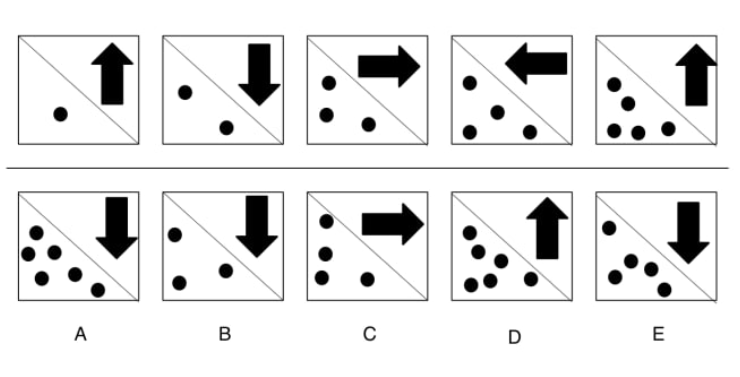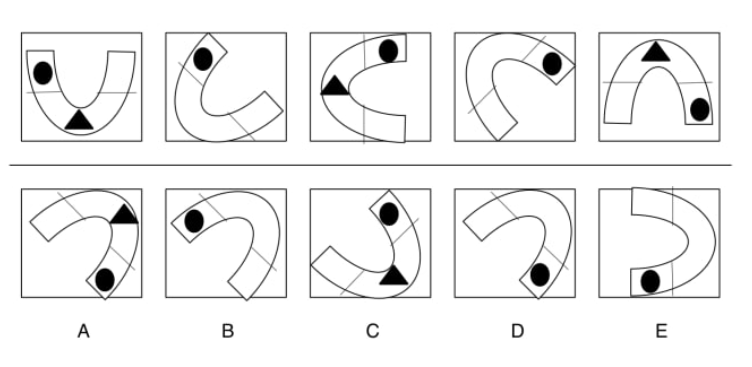I like that it shows you exactly how the pattern goes and it explains the definitions quite nicely.
What are Abstract Reasoning Tests?
Abstract reasoning tests are often called non-verbal reasoning tests because the questions consist of shapes and images, rather than text-based problems. This is to assess your ability to identify patterns and relationships between objects and apply the rules of the logic to find the correct answer.
Many people struggle with abstract reasoning as it is not something that they have come across before and the tests are designed to be challenging. Since the job market for financial roles is so competitive, companies want to ensure that they identify the strongest candidates and many use ability tests to do that. However, this guide to abstract reasoning can help you understand what to expect and feel more confident about your abilities.
What Types of Questions Can I Expect on an Abstract Reasoning Test?
As mentioned, abstract reasoning tests present primarily image-based problems, which you need to carefully examine to identify similarities and differences to understand the pattern.
For example, you could be presented with a sequence of rotated images and have to identify the answer which completes the pattern, or conversely, does not fit. This is also known as spatial reasoning, which is used to assess how well you visualise in your mind's eye and manipulate shapes mentally.
Abstract reasoning tests are most often multiple-choice, meaning that you will get a set of possible answers from which to choose the correct one. Some people think that this means that the tests are easier, but abstract reasoning can be fairly complex and the answers can look very similar.
Another aspect that makes abstract reasoning challenging is the time pressure. Usually, an abstract reasoning test given for recruitment will give you a minute or less per question, which means you need to pay attention to your timings and work quickly.
How is abstract reasoning different to logical and diagrammatic reasoning?
There is very little difference between abstract and diagrammatic reasoning tests as they both ask you to process sequences of shapes and identify patterns and relationships between the images. However, there are two main types of logical reasoning test, which informs what kind of questions you will be asked.
Inductive reasoning is where you are asked to first determine the rules of the patterns, then use this to choose the correct answer.
Deductive reasoning is known as top-down logic, where you are given the parameters and reach the conclusion from that. With deductive reasoning there is no uncertainty as all statements are taken as true.
You may not be told explicitly what kind of logical reasoning is being used, and often there is a mix of question types. Therefore, your best approach is to become familiar with each type, so you know what is being asked of you when it comes to taking your test.
Why are Abstract Reasoning Tests Used?
Employers like to use abstract reasoning tests because they test skills and competencies that are hard to judge through traditional recruitment methods. Abstract reasoning assesses something called your “fluid intelligence”, which refers to how well you solve problems, process new information, and think creatively. These are highly valued skills in the financial industry, where your role will often ask you to react to spontaneous changes with a level head.
Financial jobs are extremely competitive, so abstract reasoning tests are a good way to gain objective data on your cognitive abilities. If you perform well on this test, it shows you work well under pressure, can process new and complex information, and think in abstract terms.
Top Five Tips to Prepare and Pass Your Abstract Reasoning Test
1. Do brain training exercises. While practice papers are a great way to improve your score, doing other kinds of abstract reasoning like puzzles, sudoku, and even video games can work the same skills.
2. Read the question carefully. Abstract reasoning questions are deliberately tricky, so go over each question thoroughly to make sure you know what is being asked of you.
3. Be mindful of time. Most abstract reasoning tests are tight on timings and that can be stressful. Keep an eye on the clock and manage your time efficiently, for example, if a question is too difficult, move on and come back at the end.
4. Forget outside knowledge. The only information you need for these tests is what is given to you in the questions. Do not overthink by using knowledge you have outside of the statements.
5. Stay calm. These tests can be tricky and frustrating, however, the worst thing you can do is lose your cool. Even if you're struggling, remain calm and keep working through the questions - you'll score a lot higher than if you give up.
Abstract Reasoning Practice Questions
Q1) Which of the boxes comes next in the sequence?
Q2) Which of the boxes comes next in the sequence?
Solutions
Q1) Answer = A
Please note: circles are in no particular pattern within the lower segment. It is merely the number of circles that are important for this sequence. Arrow changes direction from pointing up, to down, to right, then to left with each turn. Circles increase by one with each turn.
Q2) Answer = D
’U’ shape rotates by 45 degrees with each turn. Circle remains in same position of the ’U’ shape with each turn. Triangle appears (middle section of ‘U’ shape) on every alternate turn (i.e. 1st frame, 3rd frame, 5th frame).
Jump to a section on this page:
- What are Abstract Reasoning Tests?
- What Types of Questions Can I Expect on an Abstract Reasoning Test?
- How is abstract reasoning different to logical and diagrammatic reasoning?
- Why are Abstract Reasoning Tests Used?
- Top Five Tips to Prepare and Pass Your Abstract Reasoning Test
- Abstract Reasoning Practice Questions
- Abstract Reasoning Tests Sample Questions
- Abstract Reasoning Tests Tips
- Abstract Reasoning Tests FAQs
Sample Abstract Reasoning Tests question Test your knowledge!
Which of the boxes comes next in the sequence?

- A
- B
- C
- D
- E
The solutions at the end of every test are evident and easy to understand.
Samuel used Fintest to help pass his aptitude tests for HSBC.

Abstract Reasoning Tests Tips
- Get to Know Abstract Reasoning
Familiarizing yourself with the types of shapes, patterns, and logic involved in abstract reasoning is crucial. Study different question types and patterns to anticipate what you’ll face on the test.
- Practice Regularly
Regular practice can significantly improve your ability to identify underlying patterns and rules in the test. It’s a skill you can develop with consistent effort.
- Work on Your Speed
Time is of the essence with these exams, so focus on working quickly without sacrificing accuracy. Timed practice sessions can help you get used to the pressure.
- Free Practice on Fintest
You can give practice tests of these types of test on this website for free to gauge your current ability and track your improvement over time.
- Stay Calm and Focused
During the test, staying calm can help you think clearly and solve the problems more effectively. Stress management is just as important as test prep.
Level up
Choose the package that works for you.
Pro
- 12 Aptitude packages
- 20 Admissions packages
- 162 Employer packages
- 17 Publisher packages
- Dashboard performance tracking
- Full solutions and explanations
- Tips, tricks, guides and resources
- Access to free tests
- Basic performance tracking
- Full solutions and explanations
- Tips and resources
Abstract Reasoning Tests FAQs
- What is this test used for?
These tests are commonly employed by companies in the financial sector to assess a candidate's aptitude for recognizing patterns and logical rules, which is key in many industry roles.
- What do these tests involve?
Abstract reasoning tests consist of identifying relationships, patterns, and trends among shapes and figures to select the correct answer within a time limit, honing in on your critical and analytical thinking skills.
- What do these tests measure?
Our tests harness advanced algorithms to stay up-to-date with current industry standards, measuring your ability to quickly analyze and respond to complex, abstract information in a dynamic and precise manner.
- Where can I practice these tests?
Fintest offers comprehensive practice tests tailored to mirror the real exams. It’s a fantastic resource to prepare for the actual challenges you’ll encounter from prospective employers in the financial sector.
- Which employers use these tests?
Many reputable employers within the financial sector incorporate these tests into their hiring process, seeking to identify professionals who demonstrate strong problem-solving and analytical capabilities.
Reviews
What our customers say about our Abstract Reasoning Tests
Arnette Pillay
South Africa
December 09, 2022
Follow the pattern
Devika A
India
December 20, 2022
The pattern of the figure
I liked that the level of difficulty was moderate, so it did not discourage me from taking the test.
Sakura Grant
New Zealand
January 10, 2023
solid abstract reasoning test
simple and relatively easy abstract reasoning test that mostly asks you to complete a sequence of boxes
Matias Mesta
Mexico
May 18, 2023
Informative test
I was able to identify patterns in the way the questions are designed. I would have liked to have different questions in the timed test once I did the practice test.
Beatrice Prisca Chirwa
United Kingdom
June 13, 2023
It was abit hard
I disliked it because it's my first time taking these types of questions. I liked it because it was something new and I am happy to learn more
Angel Nwokike
Nigeria
November 03, 2023
Educative
The test helped me gain more knowledge on the topic which i am practicing in order to ace an interview i have coming up soon.
Gess jamandre
Philippines
November 03, 2023
The most important to know in this test is analyse each pattern and choose the possible answer you chose.
I like this test , because it helps me to widen my critical thinking,by choosing and analysing every boxes to have a possible answer.
Raquel A.
Portugal
November 03, 2023
To improve my skills
Interesting...I think I'm improving, so that I didn't find the test so hard like the previous tests I've made.
Revathi Menon
Australia
May 27, 2024
We need to understand the positioning and act fast
I really liked the test . It was innovative and felt like the logical questions in the written test were tested live like a game.
Makayla
Samoa
May 27, 2024
Know the sequence
It was hard as I kept moving on to answering the questions. It was confusing to find the sequence of the picture but overall it was fun






